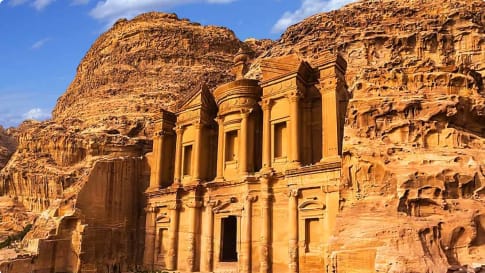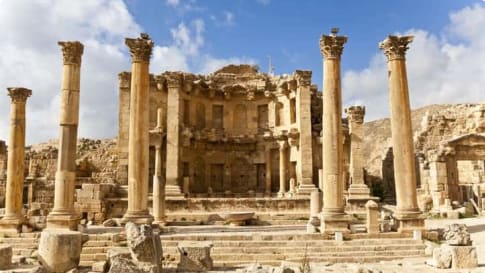Destination: Jordan
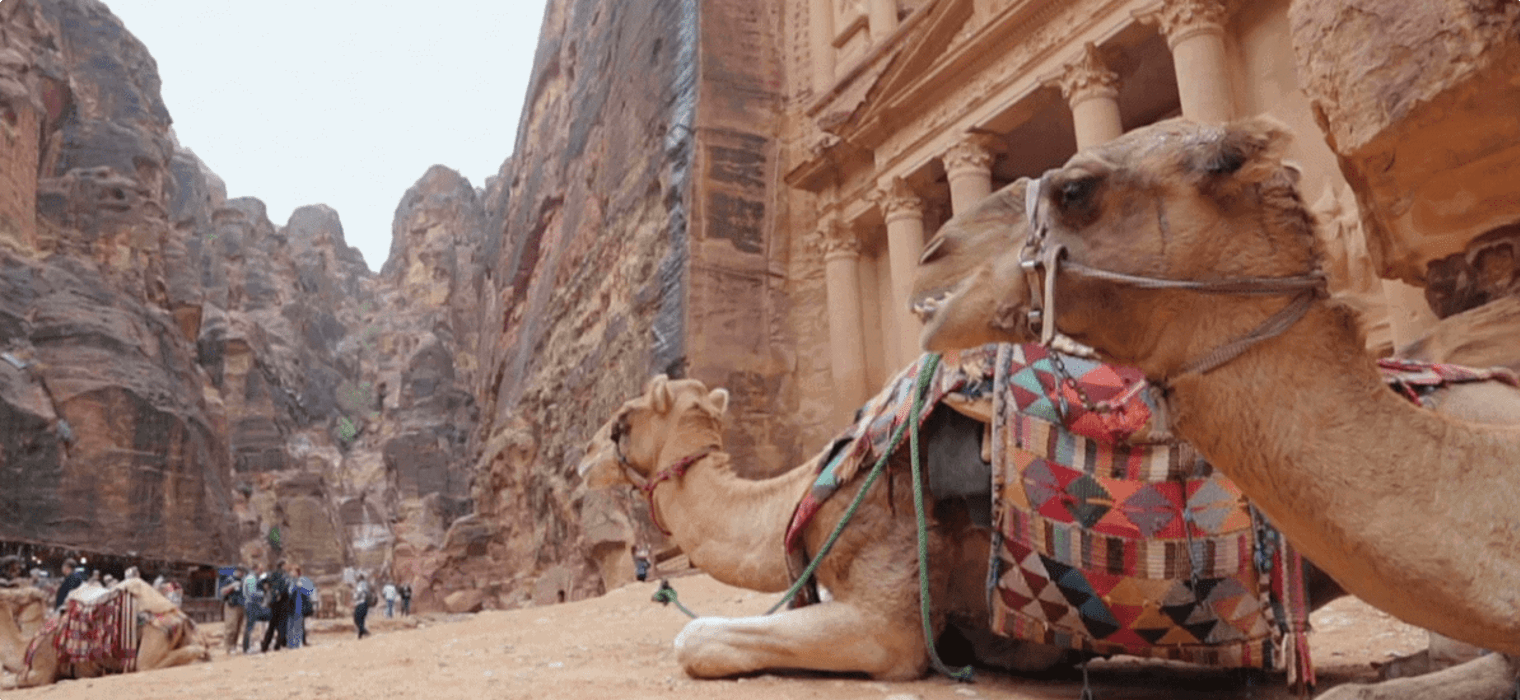
Jordan tours for seniors
Jordan is a land steeped in history and grandeur. Its past, rich with the legacy of ancient civilizations, has bestowed upon it a remarkable cultural tapestry. Among its many treasures stands the iconic city of Petra, nestled amidst vibrant pink cliffs, a historical marvel reminiscent of Egypt’s Pyramids at Giza. Beyond the desert expanse, remnants of antiquity grace downtown Amman, where the Citadel stands proudly showcasing a blend of Roman, Umayyad, and Byzantine architecture atop an ancient Bronze Age foundation. Noteworthy is the well-preserved Roman amphitheater within, serving as a venue for contemporary cultural gatherings. Delving into Jordan’s medieval significance unveils the story of Karak, a 13th-century crusader fortress that bears witness to the country’s pivotal role during the Crusades.
Continues below
Jordan Tours
Hand crafted tours for mature world travellers
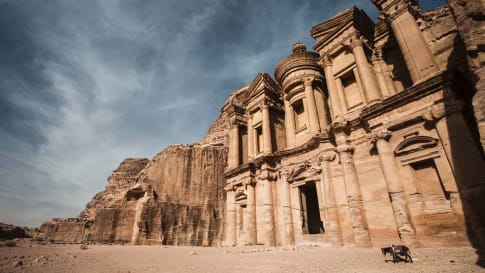
9 days
Oct, JanAncient History of Jordan | Escorted Small Group Tour
Visiting Jordan
Explore Jordan, visiting its capital city, Amman Jordan, the ancient Desert Castles, Petra and the Dead Sea on a small group package tour for mature and senior travellers travelling as a couple or Solo.
From A$5,850 AUD
View TourJordan’s breathtaking landscapes complement its cultural history seamlessly. Traversing the same paths once tread by Lawrence of Arabia, the captivating desert hues of Wadi Rum evoke a deep sense of admiration. Underneath the crystal-clear waters of the Red Sea lies a diverse marine ecosystem teeming with vibrant coral reefs and fascinating shipwrecks. Drifting effortlessly in the buoyant waters of the Dead Sea, notoriously the Earth’s lowest point, is believed to offer nourishing benefits to one’s skin. Each journey through Jordan promises an unforgettable encounter with nature’s wonders. Embark on a transformative expedition with Odyssey Traveller as we unravel the mysteries of this captivating country in the heart of the Middle East.
Articles about Jordan

Petra, Jordan
Explore and learn about Petra Jordan on an escorted small group package tour to the Middle East for mature and senior travellers. For couples and single travellers, this tours looks at the Romans, the silk road and the Egyptians in ancient history and the trade that passed through the region.
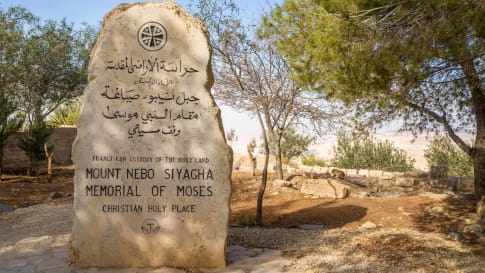
Mount Nebo, Jordan
Mount Nebo is a revered holy site. According to the Hebrew Scriptures, Moses, who led the Israelites in an exodus out of Egypt across the desert for 40 years.

Understanding Petra
Burckhardt's Journal describes the discovery of Petra. This ancient ruin is a feature for mature and senior travellers on an Odyssey small group package tour of Jordan for couples and singles. The group learn and explore Petra as part of the overall program examining the ancient history of the middle east and trade that linked all the way through to the Silk road.

Jordan: A Definitive Guide
A small group tour of Jordan for senior and mature travellers explores this ancient civilisation with visits to Petra, Wadi Rum, Madaba and other places on this tour which is often paired with Odyssey's Egypt tour.
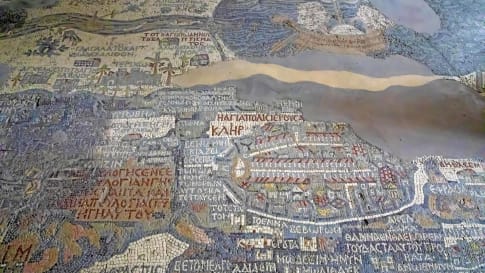
Madaba, Jordan
Madaba, Jordan Madaba is a town in west central Jordan situated on a highland plain 760 metres above sea level, 32 kilometres south of Amman. It is famous today in historical cartography for the Madaba…
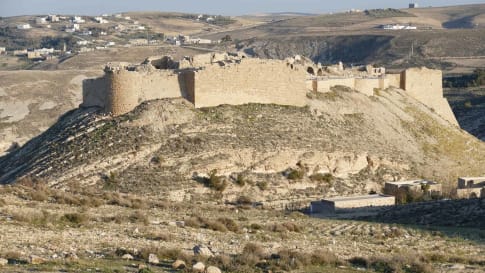
Shobak Castle, Jordan
Shobak Castle in Jordan is part of the tour itinerary to visit Jordan for a small group tour for mature and senior travellers with an interest in contemporary and the ancient history of the Middle East. Join as a couple or solo traveller on this package tour offered each year.
Touring Jordan
The need to know
Getting around
When embarking on an Odyssey tour in Jordan, the mode of transport primarily involves coach travel, with occasional use of local transportation such as trains and ferries, as specified in the detailed tour itinerary. While buses serve as the prevalent means of transportation in Jordan due to their affordability, it’s worth noting that they often do not adhere strictly to set schedules. In urban areas like the capital city, Amman, taxis are widely available and convenient, although outside of Amman, taxi meters are typically calibrated in fils rather than dinars, necessitating caution to prevent overpayment. Regrettably, passenger train services are not operational within Jordan, rendering train travel an unavailable option for exploring the country’s diverse landscapes.
Accommodation
In urban settings, Odyssey accommodations typically consist of centrally positioned 3-4 star hotels, which offer convenient access to public transportation. In contrast, when venturing into smaller towns or rural regions, we opt for charming family-operated hotels or guesthouses. For our extended stays, where you remain in one place throughout the tour, we arrange comfortable accommodations in serviced apartments.
Tour Guides
Odyssey consistently partners with local guides who possess in-depth regional insights, guaranteeing an authentic experience that delves into the rich history and culture of the destinations you explore.
Geography environment and weather
Jordan spans 91,880 square kilometers, predominantly encompassing a flat desert plateau with over four-fifths of its land characterized by desert terrain. Positioned as a landlocked country, it boasts a 26-kilometer shoreline along the Gulf of Aqaba. To the west, the Great Rift Valley serves as a geographical demarcation separating the East and West Banks of the Jordan River. Notably, this Rift Valley features various geological depressions, with the region surrounding the Dead Sea plunging to approximately 1,410 feet below sea level, marking the Earth’s lowest natural point.
Regarding its climate, Jordan experiences a Mediterranean-style climate, characterized by scorching, arid summers and mild, changeable winters. Rainfall predominantly occurs in the winter months, underscoring the importance of checking weather forecasts and dressing appropriately depending on the time of your visit.
World Heritage sites
Jordan boasts 5 UNESCO World Heritage Sites, each offering a unique glimpse into its rich history and cultural heritage. Among these sites is Quseir Amra, a desert castle renowned for its impeccably preserved structure adorned with intricate murals and artwork. Another notable site is Um er-Rasas, an archaeological gem showcasing the remains of a fortified Roman camp along with remnants dating back to the Roman, Byzantine, and Early Muslim eras. Additionally, the Wadi Rum Protected Area spans over 74,000 hectares and houses a plethora of ancient rock carvings, inscriptions, and petroglyphs, providing visitors with a fascinating journey through the region’s past.
Festivals and events
Jordan hosts a variety of festivals and events annually to honor its rich traditions and cultural heritage. Among them, the Jerash Festival stands out as one of the largest gatherings, taking place every July in Jerash city. This vibrant event attracts a multitude of attendees who flock to witness captivating showcases of music, dance, and literature. Additionally, workshops and seminars are conducted to enrich the experience for participants.
The Aqaba Traditional Arts Festival, held in February, pays homage to the culture of Jordan’s indigenous Bedouin community. This festival provides a platform to showcase and sell the exquisite handicrafts and products crafted by Bedouin artisans on the lively streets of Aqaba.
Furthermore, Muharram holds significant importance in Jordan as it heralds the commencement of the Islamic New Year. This period is embraced with elaborate feasts and joyous dancing, symbolizing a time of jubilation and new beginnings in the country’s cultural tapestry.
Reading list
- Petra: The True and Surprising History of the Lost City of Stone, by Patrick Auerbach
- The making of Jordan, by Joab B. Eilon
- Lion of Jordan: The Life of King Hussein in War and Peace, by Avi Shlaim
- A Pilgrim’s Guide to The Holy Land: Israel and Jordan (Pilgrim’s Guides), by Raymond Goodburn
Eating and Drinking
Jordan’s culinary landscape reflects a fusion of influences from the wider Levant and historical ties to Turkey and the former Ottoman Empire. Mansaf, the national dish of Jordan, exemplifies this blend, featuring lamb cooked with fermented dried yogurt powder and served alongside rice. Mezze dishes, a staple in Jordanian cuisine, offer a diverse selection of small plates typically served at the onset of multi-course meals. These may include fattoush, a flavorful salad of garden vegetables and pita bread, tabbouleh made with bulgur, tomatoes, parsley, mint, and onions, and hummus, a creamy chickpea puree infused with tahini, olive oil, lemon juice, and salt.
Tea and coffee play integral roles in Jordanian social gatherings, with coffeehouses serving as vital community hubs across the country. Despite being a predominantly Muslim nation, Jordan does not stigmatize alcohol consumption, as evidenced by arak, an aniseed-flavored alcoholic beverage commonly enjoyed with meals. To combat the country’s sweltering temperatures, a rich variety of fruit juices are produced and savored throughout the year. From refreshing pomegranate and apricot juices to invigorating lime-mint blends, Jordanians have an array of delicious beverages to choose from to beat the heat.
Health and safety
Currently, smartraveller.gov.au cautions travelers to exercise a high level of caution when visiting Jordan. This advisory stems from potential protests in the country triggered by local and regional events. It is advisable to steer clear of demonstrations and crowded assemblies to mitigate exposure to potentially volatile situations. Moreover, border regions adjacent to Syria and Iraq are deemed risky because of the persistent conflicts in these neighboring nations, making it prudent to refrain from journeying to these specific areas.
Electrical supply
When traveling abroad, it is essential to bring along a suitable travel adapter. In Jordan, the electricity operates at 230V and 50Hz. The country utilizes various electric plug types such as Types C, D, F, and J plugs, underscoring the importance of having the correct travel adapter on hand to ensure seamless access to power during your stay.
Tour Reviews
The local guide was outstanding. She had excellent knowledge, helped us shop and went beyond reasonable to give us an authentic experience of Iran.
Participant -17
Iran Culture and History Escorted Small Group Tour for seniors
FAQs
What time zone is Jordan in?
Armenia has a single time zone, Armenia Standard Time (UTC+4). Armenia does not observe daylight savings.
Is tipping customary in Jordan?
When traveling in Jordan, understanding tipping etiquette is crucial, particularly in establishments like restaurants and hotels where wages can be modest. In Jordanian culture, tipping is significant, with the customary amount being around 10% of the bill. If you find yourself exploring independently or during leisure time, it’s essential to tip appropriately to show appreciation for the services provided. Odyssey tours typically handle tipping arrangements, alleviating the need for travelers to worry about this aspect during organized excursions.
What is the internet access like in Jordan?
Wifi should be freely available in most hotels, cafes and restaurants.
Can I use my mobile/cell phone while in Jordan?
Verify with your mobile phone carrier if you can make calls and use data while in Jordan. Some carriers offer daily fees for calls and internet usage at standard rates. Ensure to notify your provider about your international travel to avoid service interruption due to suspicious activity, similar to banks suspending accounts.
What are the most famous places to visit in Jordan?
Jordan is truly a captivating destination with its prime attraction being Petra, an ancient city etched into sandstone cliffs that stand as a testament to a history spanning over 2000 years. The ruined city of Jerash also holds its ground as a significant historical gem, offering a glimpse into Jordan’s rich Roman heritage. For a unique desert experience, visitors should consider staying in one of the Bedouin camps dotting the desert expanse of Wadi Rum, where majestic sandstone cliffs blend harmoniously with vibrant-hued dunes, creating a surreal landscape worth exploring.
When is the best time to visit Jordan?
For an optimal experience in Jordan, the prime periods to visit are spring (March – May) and autumn (September to November). During these seasons, the climate is moderate, offering ideal conditions for immersing oneself in the wonders of Jordan’s iconic landmarks.
Why is Petra called the "lost city"?
Petra, once a significant city in antiquity, faded into obscurity after the 14th century AD. Its existence was entirely unknown to the western world until 1812 when the Swiss explorer Johann Ludwig Burckhardt stumbled upon its hidden splendor. In a bold move, Burckhardt infiltrated the heavily guarded site under the guise of an Arab traveler from India seeking to pay homage at the tomb of the Prophet Aaron.
What should female tourists wear in Jordan?
Avoid v-neck tees that reveal cleavage, tops exposing your back, or skirts showing too much leg. In Jordan, some women opt for a black niqab covering their face, leaving only their eyes visible, while others prefer to cover their hair partially or leave it uncovered. If you decide to keep your hair down, ensure it is completely dry before stepping out, as wet hair is considered inappropriate.
Articles about Jordan published by Odyssey Traveller:
For all the articles Odyssey Traveller has published for mature aged and senior travellers, click through on this link.
External articles to assist you on your visit to Jordan:
Responsible travel tips for Jordan
- Learn some local greetings to facilitate interactions. Even though many locals can communicate in English, familiarizing yourself with the native language can enrich your experience in the country.
- Keep a business card from your hotel handy in case you need assistance finding your way back if you get lost.
- Ensure that you have travel insurance coverage at all times. If you require guidance on this matter, feel free to reach out to Odyssey for expert advice and support.
- If you are traveling independently, it’s crucial to verify the opening hours of shops and museums to avoid missing out on visiting them. Note that museums and galleries are commonly closed on Mondays. Additionally, check for any upcoming public holidays during your trip to plan your itinerary effectively.
- Contact your bank in advance to notify them about your overseas purchases to prevent any potential account flags for suspicious activity. Confirm the compatibility of your cards with local ATMs and banks to minimize withdrawal fees.
- Prior to your departure, ensure you have a variety of dinar denominations. While you shouldn’t carry excessive cash, having enough on hand will simplify transactions in places that may not accept credit cards. This approach can help you avoid card fees and streamline the tipping process.
